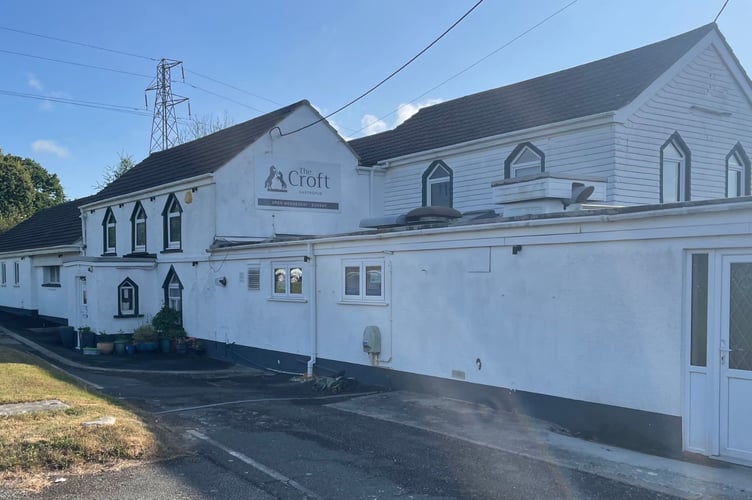EACH week, hundreds of planning applications come before Cornwall Council’s planning department, seeking to win approval for various plans right across the Duchy.
These plans can comprise of a number of different reasonings – ranging from permission to replace windows or listed building consent ranging up to large house building developments or changing of use of a building, for instance, from an office to a café, or flats.
Within this large and often complex system, there are a number of formats from which planning advice and approval can be sought.
These range from full applications where all the details which comprise a proposed development or work to a building are submitted, to outline applications, where further details are yet to be confirmed, for example, an outline application with reserved matters for appearance may not confirm the final proposed development but rather seek permission in principle.
An example of this is one for an outline permission for 20 dwellings on land with reserved matters for appearance and scale; the reserved matters would require further permission later for their inclusion.
Other types of applications include pre-application advice requests, where would-be developers submit often outline proposals to a local authority to ascertain whether it is likely to gain support or not prior to submitting a planning application.
The vast majority of applications are decided by planning officers employed by a local authority under ‘delegated powers’, meaning they do so on behalf of their employer, however, some applications are ‘called in’ by local councillors to be discussed at an area’s strategic planning committee meeting, meaning the final decision rests with a committee of councillors.
Use of land for self storage facility next to closed pub refused
PLANNING permission has been refused for the change of use for land next to a pub to be used as a self-storage facility near Saltash.
Roods Group Ltd submitted the application concerning The Croft Inn, Hatt, Saltash.
The applicant told Cornwall Council: “The Croft pub and restaurant is a 20th century building which is part single and two storey. To the rear of the pub sits some 30, 1-bed chalets arranged in 6 single-storey blocks.
“The Croft closed in spring 2023 due to pressures from rising costs which lead to the site including the hotel accommodation becoming unviable. As a temporary measure the hotel accommodation (the chalet rooms to rear) are being used by the Council as emergency accommodation.
“This has provided an economic benefit to the site and allowed the chalets to be refurbished as well as delivering a social benefit by providing much needed accommodation. This use is, however, very much seen as a temporary measure, my client’s ambition and aim is to reopen the site as a fully functioning pub, restaurant and hotel.
“With this in mind, the site due to its size and accessible position has been reviewed holistically with the aim to provide additional income streams which can support and help diversify this existing commercial site. The application site forms part of the wider site and has been previously used as yard area and overspill carpark.
“The site is not farmland and is part covered with hardcore. This application seeks to utilise this un-used land to provide a self-storage site. This would comprise of sitting shipping containers on the land and providing secure fencing. No formal built development (buildings etc) is required.
The council’s planning department noted: “The current application proposes the development of a self-storage business as a means of diversification associated with the Public House and accommodation.
“However, schemes for diversification are typically expected to refer to existing agricultural and other land based rural businesses (as set out above), which is not the case on this occasion, nor is there any evidence to demonstrate that self-storage requires a countryside location.
“Notwithstanding this, some information has been submitted with regard to initial costs and potential income. However, no evidence has been provided to demonstrate how the potential income would supplement/support the public house (which is currently closed).
“There would be no linked trips given the current closure of the public house. Notwithstanding the concerns raised regarding the proposed diversification of the existing business, consideration should also be given to whether the growth and expansion of a business in this rural area is sustainable.
“With regard to scale and sustainability in relation to location, it is understood from the submitted business plan that the intention is to begin with 10 - 20 units (shipping containers), with additional units added as demand grows. However, as per the block plan, permission is sought for a total of 153 units which is what must be considered in the assessment of the application.
“The scale of development is considered to be excessive and inappropriate for this countryside location. Furthermore, there is a lack of evidence to suggest that there is a local need for a storage facility of this size in this location, with a number of facilities already available within more sustainable locations in nearby Saltash.
“It is accepted that paragraph 89 of the NPPF identifies that sites to meet local business and community needs in rural areas may have to be found adjacent to or beyond existing settlements, and in locations that are not well served by public transport. “However, in this case, it has not been demonstrated that there is a local business or community need for a development of this type or scale in this location.
“It is further acknowledged that a limited bus route does serve the site, however given the nature of the proposal, it is very likely that customers/visitors will utilise private vehicles. Therefore, it is not considered that the availability of a (limited) bus service is an overriding factor to enable support for the proposal.”
Refusing the application, Cornwall Council told the applicant: “By reason of the countryside location of the site, divorced from the nearest settlements of Hatt and Saltash; the scale of the development proposed, that being 153 self-storage shipping containers; and in the absence of any overriding locational and business need for the development to be sited in such location, the proposal is not considered to represent a sustainable form of development.
“Moreover, the development would introduce an industrialised character to this undeveloped parcel of land within a largely rural location that lies within the immediate setting of the Tamar Valley National Landscape.
“The application fails to provide any details on the size, design, or external treatment of the shipping containers, nor does it provide details of any security measures, fences, lighting etc, thus preventing a full assessment of the visual and landscape impact of the scheme.
“Nevertheless, owing to the proximity of the site to the National Landscape, industrial nature of the proposal, excessive scale and visibility from wider viewpoints, it is considered that the scheme would represent an incongruous and inharmonious addition, resulting in a degree of harm to the landscape and scenic beauty of the designated landscape that is not outweighed by public benefit.”
- Keep up to date with the latest planning applications and other statutory notices (such as alcohol licensing and probates) that affect where you live by visiting our online Public Notice Portal – be the first to know by visiting www.publicnoticeportal.uk/cornish-times-series.


.jpg?width=209&height=140&crop=209:145,smart&quality=75)
.jpg?width=209&height=140&crop=209:145,smart&quality=75)

Comments
This article has no comments yet. Be the first to leave a comment.